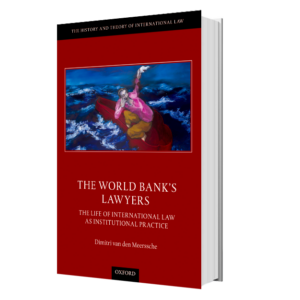Dimitri van den Meerssche

This book provides a recent history of international law as expressed through particular institutional practices, performances and personalities. Yet, for a narrative on the evolving and embodied life of international law, this protagonist appears rather absent and elusive: rarely will this abstract figure—a field, a language, a body?—reveal itself in confident and comprehensive conceptual contours. This is not a book on international law’s ruling rationale, immanent grammar or vacillating oscillations between empire and empowerment. Instead, this ethnographic exploration of legal practice in the World Bank reveals a world teeming with life—a space where idealized professional postures and prototypes, aesthetic styles, institutional alliances and technical routines are woven together in law’s ever-shifting mode of existence.
While the rules by which the World Bank is governed and the controversies around its legal status have remained largely stable and static, the lawyering practices through which these frameworks are enacted and imbued with organizational meaning have changed quite radically. This book traces the institutional interventions and forms of knowledge that are enacted in these changing performances— the political projects they sustain, the sensibilities they signal and the social criteria of competence that determine their direction. Inspired by Latour’s relational sociology of associations, this account thereby seeks to multiply the matters of concern in our study of international law(yering): the human and non-human, material and semantic, obscure and evasive actants that tie together and maintain the fragile fabric of legality. As a material history of the lived practices and cultural techniques that mark international law, the book aims to tell us something about the discipline’s disenchantment and the displacement of its traditional tropes and tools by more unexpected and unruly actors. It is thereby, inevitably, also an argument on the politics of international law and the inscription of its language in evolving modes of global governance and rationalities of rule—from the templates of liberal reform that marked the World Bank’s operational expansion to contemporary registers of resilience and risk.
This exploration ventures onto new methodological terrain. While a quest for ‘unity within diversity’ entailed a strong comparative, conceptual and doctrinal orientation in the formation of international institutional law, the book’s attempt at multiplying and materializing this object of study demanded a deep dive into the world of practice. Guided by the methodological tenets of actor–network theory, this ethnographic inquiry into the life of law follows agents and actants (including lawyers, texts or norms) through the relational networks they sustain and the performative politics they express. The archive for this account consists of months of participant observation in the World Bank’s legal department, existing oral histories, interviews, strategies and legal memoranda, documents obtained through freedom-of-information requests and staff guidance notes. What emerges from these sources is an image of law as a contingent cultural technique invested with evolving aspirations and ideals.


